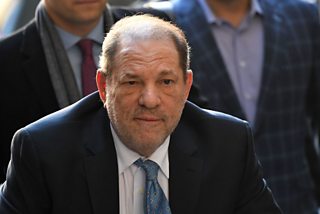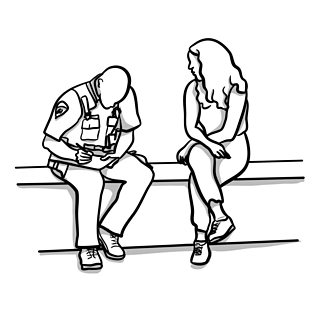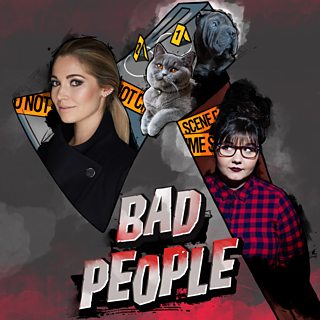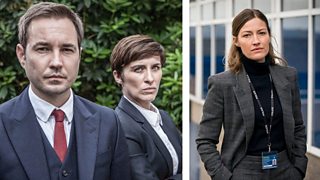Weinstein: Why so many witnesses of sexual harassment stay silent
In the 91�ȱ� TV drama, Ashes to Ashes, a fictional depiction of the Metropolitan police set in the 1980s, there’s a scene where DI Alexandra Drake (played by Keeley Hawes) is greeted by a room full of (almost exclusively male) colleagues, waiting to watch her being ‘stamped’ by sexist throwback, DCI Gene Hunt (played by Philip Glenister).

It should come as no surprise that a recent report found 97% of women aged 18-24 have been sexually harassed, and that 96% of them did not report it."
In the real world the Met have been under scrutiny for sexual misconduct allegations, and this is part of a wider dialogue asking why women are still enduring sexual harassment and violence, and why so little of it gets reported.
On episode 27 of Bad People, I talk with Dr Julia Shaw and comedian Sofie Hagen about the Harvey Weinstein case. We explore how he could perpetrate sexual assault on such a scale and explore why witnesses who knew about his horrific workplace abuses kept this ‘open secret’ for decades. Why didn’t they speak up sooner?
Most of us have heard shocking stories about Harvey Weinstein and the tactics he used to keep his victims silent. So, it should come as no surprise that a recent report found 97% of women aged 18-24 have been sexually harassed, and that 96% of them did not report it. However, it is perhaps less widely known that powerful witnesses knew of his behaviour and did nothing about it.
I often ask myself whether incidences of sexual harassment are witnessed and, if so, do witnesses report them?
1. Everybody knows

Scott Rosenberg wrote that 'everybody knew' what Harvey Weinstein was doing but did nothing to help."
I recently worked with Julia and Dr Rashid Minhas on designing a to help people report workplace harassment and discrimination. It soon became clear that, as well as victims rarely reporting incidences, bystanders were also not reporting what they had witnessed. We conducted a to explore this and found that 77% of witnesses who took part did not report what they had seen.
This was echoed in the Weinstein case. Screenwriter Scott Rosenberg wrote that everybody knew what Harvey Weinstein was doing but did nothing to help. In our survey, 43% of the witnesses indicated that ‘everybody knew’ about the incidents they were describing, and this was often why they did not report.
One reason why this might have been the case comes from research into bystander behaviour. In 1970, researchers proposed the notion of a ‘Bystander Effect’, which suggests that the more people who witness an incident, the less likely it is that any of them will intervene. This suggests that as the number of people who witness an act of sexual harassment grows, the likelihood of it being reported diminishes.
2. It’s not my responsibility
The ‘Bystander Effect’ also suggests that people don’t intervene because they feel less responsibility when other witnesses are around. In our survey, 44% of the witnesses did not report because they thought reporting was the victim’s responsibility. This assumption is mirrored in the real world.
Hashtags like #whyididntreport on Twitter serve multiple stories that paint an uncomfortable picture: reporting is seen as something that victims should do. The problem with this assumption is that being sexually harassed is already an isolating experience, so placing the burden of tackling harassment on victims alone isolates them further, as well as reducing the number of incidences that get reported.
3. There’s no point
found that 45% of women who experienced sexual harassment in public did not believe reporting would change anything. The statistics in our survey were similar; 42% of the witnesses indicated that there was no point in reporting. About a third thought they would not be believed, and about quarter indicated that powerful people were involved. This suggests that there is a cultural problem where sexual harassment is normalised.
proposed that, as long as cultures worship people in power or normalise the objectification of women, it will be hard to break ‘the conspiracy of silence’. So, the chance of witness intervention in sexual harassment remains low, and offenders – particularly those of high profile – will continue to not be held accountable for their actions.
Should witnesses speak up?
Yes!

“I felt like a hero after the incident.”
Witnesses often fear the consequences of reporting, but it can be empowering. It can also take away the stress of knowing about harassment but doing nothing about it. One witness in our survey wrote:
The good news is that witnesses often discuss what they have seen, and when they have a ‘shared identity’ they generally try to help. So, creating a shared identity of solidarity and intolerance to sexual harassment is a good way of encouraging witnesses to speak up in support of victims. One way of creating a shared identity is to share stories, which also helps make others aware of the issues and encourage them to help. #MeToo and #ReclaimTheseStreets are real-world examples of campaigns that have given people the courage and space to tell their stories. Because of campaigns like these, shared identities of solidarity and intolerance to sexual harassment have grown, and these campaigns offer a space for witnesses to play a powerful role.
Like most women, I have experienced sexual harassment from male friends, strangers, and at previous workplaces. All my female friends have had at least one unsettling experience. The repercussions last a lifetime and creep up on us in our dreams. We shape our lives around finding ways to stay safe, yet most of us never share our experiences or ask people to speak up on our behalf.
Until cultures stop normalising the objectification of women, it takes courage for witnesses to speak up, and victims of sexual harassment are largely left to tackle their experiences alone. However, I know that if I ever witness somebody being sexually harassed, I will ask the victim if they need my help reporting it.
If you would like to hear how workplaces can help witnesses of sexual harassment to speak up in support of witnesses, head to 91�ȱ� Sounds and listen to the Bad People Episode 27 Hollywood Predator: Who reports sexual assault?
Dr Camilla Elphick is a Post-Doctoral Research Associate in the School of Psychology and Counselling at The Open University. She has been an academic advisor to ten episodes of the Bad People podcasts, and her Open University website page is here



